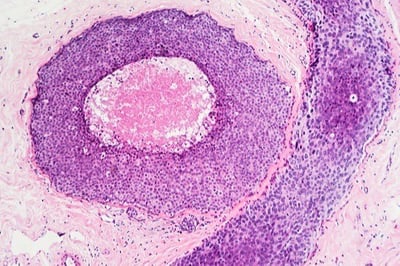FORCE's eXamining the Relevance of Articles for You (XRAY) program looks behind the headlines of cancer news to help you understand what the research means for you.
XRAY is a reliable source of hereditary cancer research-related news and information.
Learn more about the XRAY program
Categories Health Disparities
Article : Transgender peoples' perspectives of being diagnosed with gender-associated cancer
Most relevant for: transgender people
An ABC News article provides viewpoints and data that conveys the added stress experienced by transgender and gender-nonconforming people when they are diagnosed with gender-associated cancer (e.g., ovarian or prostate cancer) that does not match their gender identity. (posted 9/13/21)
Este artículo está disponible en español.
Read More
Relevance: High


Strength of Science: High


Research Timeline: Post Approval


Study : Frequency of inherited mutations linked to breast cancer are similar in Black and white women
Relevance: High


Strength of Science: High


Research Timeline: Post Approval


Most relevant for: Non-Hispanic Black and white women with breast cancer
The CARRIERS study looked at the rate of inherited mutations in women with and without breast cancer. In an extension of the CARRIERS study, researchers found no difference in the frequency of inherited mutations in breast cancer genes among Black and white women with breast cancer. A few individual genes differed in frequency: BRCA2 and PALB2 mutations were seen more often in Black women, while CHEK2 mutations were seen less often. Researchers concluded that race should not be used to determine who is referred for genetic testing. (posted 8/13/21)
Este artículo está disponible en español.
Read More
Update : Breast cancer disparities in Black Americans
Most relevant for: Black women in the US
The American Association for Cancer Research (AACR) released a 2020 report about cancer disparities among racial and ethnic groups in the United States. In this review, we highlight findings on the burden of breast cancer in Black women. (posted 8/5/21)
Este artículo está disponible en español.
Read More
Update : Cancer disparities: Colorectal cancer in African Americans
Most relevant for: African Americans concerned about colorectal cancer
The American Association for Cancer Research (AACR) released a 2020 report about cancer disparities among racial and ethnic groups in the United States. In this XRAY review, we highlight data from the report about the burden of colorectal cancer in African Americans, who have the highest rates of diagnosis and death related to the disease among all racial and ethnic groups. (Posted 4/27/21)
Este artículo está disponible en español.
Read More
Relevance: Medium-High


Strength of Science: Medium


Research Timeline: Human Research


Study : Insulin resistance linked to differences in breast cancer survival between Black and White women
Relevance: Medium-High


Strength of Science: Medium


Research Timeline: Human Research


Most relevant for: Black women
Black women are more likely to die from breast cancer compared to White women. More Black women have a condition called insulin resistance than White women. This study found that insulin resistance might be one of the reasons that Black women are more likely than White women to die from breast cancer. Additional research is needed to see if lowering insulin levels will improve breast cancer survival in Black women. (07/30/20)
Read More
Relevance: Medium-High


Strength of Science: Medium-Low


Study : Do hair dyes or straighteners increase breast cancer risk?
Relevance: Medium-High


Strength of Science: Medium-Low


Most relevant for: Young women who use hair dye or straighteners
Many women use products to color or straighten their hair. A large U.S. study linked the use of permanent hair dye and straighteners to increased breast cancer risk, particularly among black women. This XRAY reviews the limitations of this study and highlights the need for additional research before accepting these conclusions. (1/29/20)
Read More
Study : How does a breast cancer diagnosis affect employment of young women?
Most relevant for: Young women with breast cancer
Most young women who are diagnosed with breast cancer remain employed one year after their diagnosis. Among breast cancer patients who were unemployed a year later, half reported that their unemployment was due to health issues. The issues that were most associated with unemployment were stage of cancer and financial stress prior to diagnosis. (1/10/20)
Read More
Relevance: Medium-High


Strength of Science: High


Research Timeline: Post Approval


Study : LGBTQ patients recommend improvements for their cancer care
Relevance: Medium-High


Strength of Science: High


Research Timeline: Post Approval


Most relevant for: LGBTQ cancer patients and their healthcare providers.
Very little research has focused on the cancer care experiences of lesbian, gay, bisexual, transgender and queer (LGBTQ) people. This study looks at recommendations from the LGBTQ community for improving their cancer care. (6/20/19)
Read More
Relevance: Medium-High


Quality of Writing: Medium-High


Personal Story : A young woman's story of genetic testing and risk-reducing mastectomy
Relevance: Medium-High


Quality of Writing: Medium-High


Most relevant for: Young women of color with a BRCA mutation
Alejandra Campoverdi comes from a family with three generations of breast cancer. As a former White House aide and active educator in the Latina community, she has openly shared her story of genetic testing, her BRCA2 mutation and her plans for risk-reducing mastectomy at age 39. (6/6/19)
Este artículo está disponible en español.
Read More
Relevance: High


Strength of Science: Medium-High


Research Timeline: Post Approval


Study : Gaps in information about breast cancer risk and prevention impact African American women
Relevance: High


Strength of Science: Medium-High


Research Timeline: Post Approval


Most relevant for: African American women who are at high risk for breast cancer
A study showed that African American women with increased breast cancer risk experienced greater burdens in obtaining information at each step compared to white women. Racial differences in preventive choices correlated with differences in information and provider access. (3/14/19)
Read More